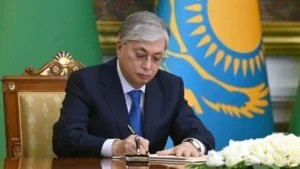Macron Reappoints Sébastien Lecornu as Prime Minister

Paris, The Gulf Observer: French President Emmanuel Macron on Friday reappointed Sébastien Lecornu as prime minister, only days after his resignation, in a move aimed at restoring stability to France’s deeply divided government and ensuring the timely passage of the 2026 national budget.
The decision, announced after days of intense consultations with party leaders, comes as Macron faces mounting pressure to resolve one of France’s most severe political crises in decades. The 47-year-old president is betting on Lecornu’s loyalty and experience to navigate a fractured parliament and avoid the political fallout of a potential government collapse.
Lecornu’s Return and Immediate Challenge
“I accept – out of duty – the mission entrusted to me by the President of the Republic to do everything possible to provide France with a budget by the end of the year and to address the daily life issues of our fellow citizens,” Lecornu wrote on X, pledging to restore stability and end “this political crisis that exasperates the French people.”
Lecornu’s first and most urgent task is to deliver a budget proposal to parliament by the end of Monday, a deadline seen as crucial to preventing a fiscal impasse.
Divisions Over Macron’s Decision
Macron’s reappointment of Lecornu has sparked backlash from opposition parties, particularly the left, which had hoped the president would name a figure from their ranks. Their disappointment underscores the fragility of the new government and the likelihood of continued turbulence in parliament.
“We’re not looking for parliament to be dissolved, but nor are we afraid,” Socialist Party leader Olivier Faure told reporters after meeting with Macron, signaling that left-wing factions are prepared for confrontation if consensus fails.
The president excluded both Marine Le Pen’s far-right National Rally (RN) and the left-wing France Unbowed (LFI) from his consultations, further highlighting the deep ideological divides in the National Assembly.
RN leader Jordan Bardella dismissed Macron’s decision as a “bad joke,” calling the president “isolated and disconnected.” He announced that his party would “immediately of course censure this coalition which does not have any future” by filing a no-confidence motion in parliament.
Economic Uncertainty and Budget Strains
France’s prolonged political instability has already taken a toll on economic confidence. Central Bank Governor François Villeroy de Galhau warned that ongoing uncertainty could shave 0.2 percentage points off national GDP this year. “Uncertainty is the number one enemy of growth,” he said in an interview with RTL radio.
The government’s struggle to rein in public spending and address a widening deficit has been at the center of political gridlock. France’s budget deficit is forecast to reach 5.4 percent of GDP this year—nearly double the European Union’s cap—while Villeroy has urged the government to keep the 2026 deficit below 4.8 percent.
Fragile Alliances and Contentious Reforms
Macron’s efforts to secure parliamentary backing for his fiscal plan have been complicated by conflicting demands. Leftist parties insist on repealing the 2023 pension reform that raised the retirement age and on introducing higher taxes for the wealthy. Conservatives, whose support Macron also needs, oppose both measures.
In a gesture toward compromise, Macron offered to delay the full implementation of the retirement age increase to 64 until 2028, a proposal Green Party leader Marine Tondelier criticized as “insufficient.”
France’s ongoing political deadlock has cost Macron three prime ministers in less than a year, with each struggling to balance competing priorities in a divided legislature. Lecornu’s reappointment represents the president’s latest attempt to avert a snap election—one that analysts warn could play into the hands of far-right forces.
Race Against Time
As Lecornu returns to Matignon, his immediate task will be to secure enough parliamentary support to pass the 2026 budget and stabilize France’s political and economic environment. Failure to do so could force the government to resort to emergency measures or even trigger another round of political upheaval.
With France’s image and investor confidence at stake, Macron’s gamble on continuity through Lecornu’s reinstatement underscores both the urgency of the moment and the narrowing options available to his administration.


